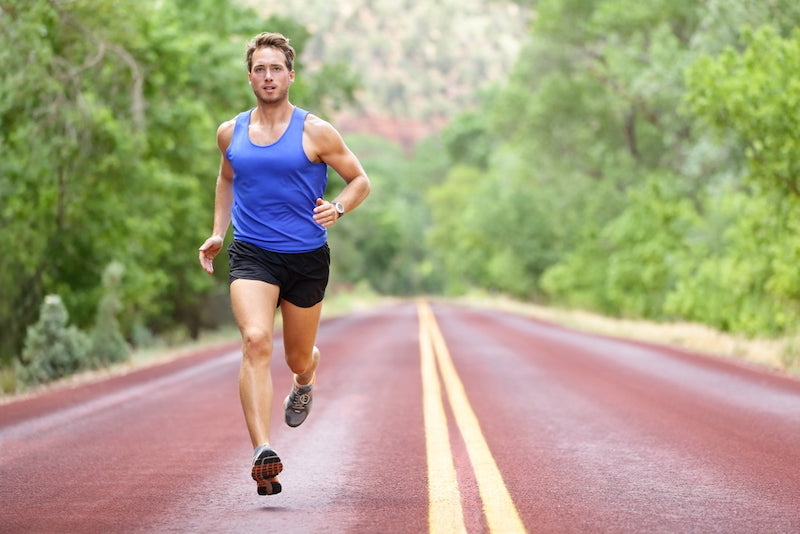Want to train for a marathon or half-marathon but are hesitant because you don’t want to lose all your muscle mass?
We’re here to tell you that you can steps to maintain all or most of your muscle mass and still run a marathon.
If anything, it could be a great thing for your body composition since you’re likely to burn a ton of calories during the training process.
But here we will look at specific things you can do to maintain muscle mass (or minimize loss) when training for a marathon.
First, Know What to Expect
While nothing is impossible, it is unlikely that you will pack on serious amounts of additional muscle while training for a marathon.
The best-case scenario for most people training for these long runs is to maintain all or most of the hard-earned muscle that they’ve already built.
But of course, the results will vary depending on your specific body type and current muscle mass.
The good news is that once the race is over, you can once again re-prioritize lean muscle gains and design your workout routine accordingly.
But while training for a marathon, there are two key aspects to consider when it comes to maintaining as much muscle mass as possible - protein intake and enough resistance training to stimulate some muscle recovery.

Optimize Protein Intake
So, how much protein do you need when training for a marathon?
More than usual for most people. And most likely, more than the RDA (recommended daily allowance), which is only 0.8 grams of protein per Kg of body weight.
If you’re like most people that train for a marathon, then you’re probably doing 2-4 moderate to long-distance runs per week.
And, in order to maintain muscle, you’ll be doing some strength training during this time, as we will discuss below.
So, that means you’ll need greater recovery than usual because the wear and tear on your muscles and joints will be greater as well.
To step up the recovery, you should increase your daily protein to the upper ends of your personal protein intake spectrum.
So, this could be between 1.2-1.6 grams of protein per Kg of body weight.
Depending on how much you weigh, how busy you are, and your appetite, this could be a challenge.
Look for easy wins with protein intake by adding in high-protein treats and snacks, or even our 1000-calorie mass gainer protein shakes.
If you’re not sure how much protein you need per day, you can use a tool like our protein calculator.
But regardless of how you get your protein, keeping your intake at a high level is crucial to maintaining muscle mass when training for a marathon.
Another quick note is that you should also adjust your overall daily calories to account for the significant addition to your training.
You can use an online calorie calculator and choose the highest level of activity to get an idea of how many calories you should be consuming to maintain your current weight.
Continue With Strength Training
With a big race right around the horizon, you might be tempted to take a complete break from strength training and focus only on running.
While that approach might work for you, and maybe even improve your race time, it’s not optimal when it comes to maintaining muscle mass.
You’ll want to continue to perform resistance training to stimulate the muscle recovery process. And then provide it with adequate amino acids (protein) as we discussed above to promote repair and growth, just as usual.
Try to schedule at least 2 strength training sessions each week as you train for your marathon.
But instead of pushing for new PRs or maxing out reps and sets, maybe dial it down to about 70% of your maximum intensity. So, a more moderate workload with maintenance in mind.
At the least, try to maintain your current strength levels, so you can hit the ground running again (with resistance training) once the race is over.
To maximize efficiency, focus on compound lifts like deadlifts, squats, presses, etc.
You’re most likely going to be tired already from your run sessions, and the last thing you’ll want to do is work 3-4 sets of each separate muscle group.
Compound lifts will involve multiple muscle groups in each exercise to give you more of a total body workout.
You’ll spend less time in the weight room and be able to maintain more of your muscle mass.

Bonus Tips
Maintaining muscle mass isn’t only about training and protein. It’s also about the other aspects of recovery.
You’ll want to step up your recovery regimen significantly to maintain as much muscle as possible. When you increase training significantly, your recovery needs will also increase accordingly.
Not paying enough attention to recovery could end up with more muscle loss than you expect.
Here are some things you can do to avoid that scenario.
Take a Creatine Supplement
Creatine monohydrate is one of the most well-researched and science-backed articles when it comes to athletic performance.
Creatine helps you have more stamina and muscle energy to complete more intense workouts. It also reduces the risk of injury and boosts the recovery process, all of which are benefits you could use from a supplement during periods of intense training.
Creatine is one of those supplements you should be taking anyway if you train a lot. But even if you don’t usually, now while training for a marathon and trying to maintain muscle mass would be the best time to start.

Step Up Your Recovery
When you train as much as you will before a marathon, you’re most likely going to feel it.
You might feel more sore and sluggish than usual, which could impact your next training session. Or you might not feel like hitting the gym for the second time in a day to hit the weights.
This is why adding some recovery protocols could be very helpful, like massage and sauna sessions. Not only will they help you recover better, but they’ll also feel great and relaxing after a grueling training session.
Research has shown that regular sauna use prevents muscle atrophy and can improve bone and muscle mass.
Using a sauna after a workout, or towards the latter part of the day can also help optimize sleep, which is another crucial element of recovery as we will discuss next.
Prioritize Quality Rest

Last but definitely not least, is optimizing quality rest. Without good sleep, there is no such thing as maximum recovery.
This is so important, especially during intense training, that it might even make sense to invest in a sleep-tracking device like a smartwatch or a sleep ring so you can monitor metrics like REM sleep and deep sleep.
But of not, just try to get a solid night’s rest each night if you can. You could use something like Naked Recovery with six US-grown adaptogenic ingredients, if you generally have trouble falling asleep after a long day.
Also Read:







